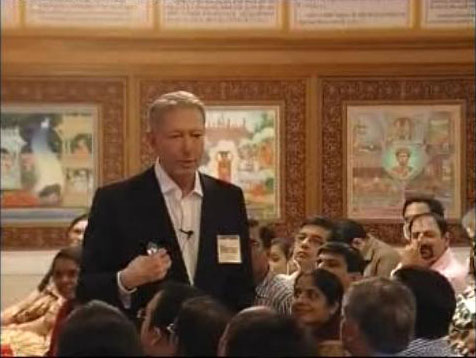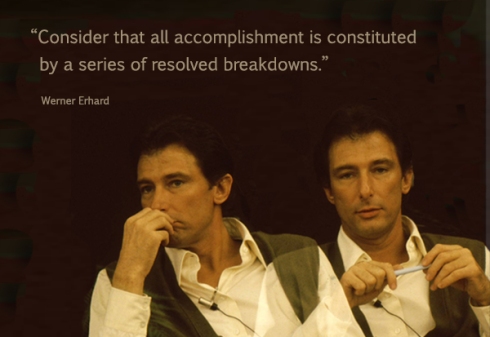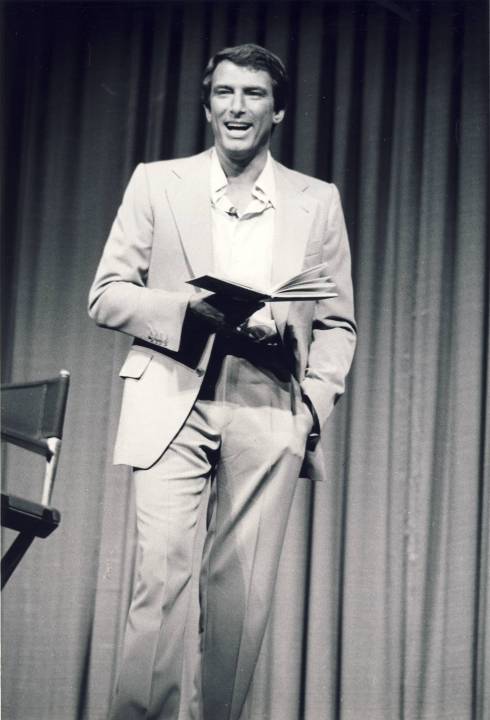You are currently browsing the tag archive for the ‘est’ tag.

The following is from the January 1977 Graduate Review:
GONNEKE SPITS: “A few months ago, Elaine Cronin, who manages the Chicago Center, was in town and Werner took Elaine, Laurel and me to dinner. We’d all been there when est started, and here we were together again. [The full staff in October, 1971, consisted of Phyllis Allen, Elaine Cronin, Sheila Pearson, Jack Rafferty, Laurel Scheaf, Gonneke Spits, and Barbara Wilson.] Werner said something at that dinner meeting that was really incredible for us. He said to us that where est really came from was not just from him as an individual, but out of the relationship that the four of us had. You know, we’d never looked at it that way. To tell you the truth, I always realized Werner was the source of est and thought we just came along with the furniture, you know.
“We got to look at what we all brought with us that was actually a part of the integrity of est. You see, without the part that Laurel represents, and without the part the Elaine represents, it’s not complete, and without the part that I represent, it’s not complete either. As est developed, some things were added that seemed to be necessary for putting it out into the world. Things like what Jack brought in, what Rich brought in, and what other people brought in, too. It isn’t that anyone was personally necessary, but whatever it was that we presented was and certainly is part of what est is.
What I have is a place to stand. Not the right place, for I do not pretend to know what is right even for myself, let alone others, but a place I am willing to try out to see if it leaves me as a clearing where the truth can more powerfully go to work.
~ Werner Erhard
“My experience of est was that it helped the participants to get more in touch with feelings and emotions and helped them let go of those that were negatively affecting their lives. It led participants to realize experientially our true freedom and responsibility. Strengthening and vitalizing the humanity of the participant, EST opened the space for a greater penetration of grace and more vigorous faith life”
~ Father Basil Pennington O.C.S.O., Monk of Cistercian Order, Roman Catholic Church, world renowned spiritual teacher and author of several books
“I am sometimes asked whether I ‘really’ mean that people are wholly responsible for their experience of life, as if I wished to blame people in poor circumstances. For example, I am asked whether accident victims are ‘responsible’ for having accidents. I hope it has become clear in the context I have developed above that such questions might involve an oversimplification. Responsibility, in my view, is simply the awareness that my universe of experience is my own including the experiences of those events in my life I call accidents.
Responsibility begins with the willingness to acknowledge that my self is the source of my experience of my circumstances. And yet, on occasion, some people think that I think accidents do not happen – or would not happen, if I were ‘really’ responsible. I am sure you will understand my occasional dismay when I am asked questions of this sort. On reflection, I usually recall that such questions derive from a well-intentioned (though perhaps limited) view of human dignity, an intention with which I can align myself, since my own intention is precisely to show that the experience of responsibility is enabling, not disabling.
I have no interest in the justification of circumstances or producing guilt in others by assigning obligation. I am interested in providing an opportunity for people to experience mastery in the matter of their own lives and the experience of satisfaction, fulfillment, and aliveness. These are a function of the self as context rather than thing, the self as space rather than location or position, the self as cause rather than self at effect.
I am not saying that you or anyone else is responsible. True responsibility cannot be assigned from outside the self by someone else or as a conclusion or belief derived from a system of concepts. I do not say that you or anyone is responsible. I do say – with me, you have the space to experience yourself as responsible – as cause in the matter of your own life. I will interact with you from my experience that you are responsible – that you are cause in your own life and you can count on me for respect and support as I am clear that I am fully responsible for my experience of you, that is to say, from my experience of the way you are.
Ultimately, one experiences oneself as the space in which one is and others are. I call this the transformation of experience. At the level of source – or context – or abstraction – I am you. That is beyond responsibility.”
From The est Standard Training, published in Biosciences Communication, 1977
“Most of our notions about the world come from a set of assumptions which we take for granted, and which, for the most part, we don’t examine or question. We bring these assumptions to the table with us as a given. They are so much a part of who we are that it is difficult for us to separate ourselves from them enough to be able to talk about them. We do not think these assumptions, we think from them.”
-Werner Erhard
“Breakthroughs are a product of seeing something in a new way, which enables you to see new opportunities and new openings for action that you couldn’t see before. Breakthroughs come as a result of shifting your commitment from the predictable future to a possible future.”
- Werner Erhard
“The way it is,
is enough.
Who you are is enough.
The only thing you have to do
is be.”
-Werner Erhard
“In manifesting your aliveness, you will want to follow a principle which was beautifully stated by Albert Schweitzer when he said, ‘I don’t know what your destiny will be, but one thing I know: The only ones among you who will be truly happy are those who have sought and found how to serve.’ Notice that Dr. Schweitzer says ‘sought and found how to serve.’ He did not say ‘try to serve,’ or ‘try something and drop it,’ or ‘do the best you can.’
Happiness comes from having served successfully.
One continues to expand in one’s ability to serve by meeting the challenge of actually delivering the results.
Decide on a project for which you are willing to take complete responsibility. Complete the project successfully. Relate this achievement to others as an inspiration for them. Your willingness to express yourself may be just the trigger needed by someone else to do something for themselves. From now on, don’t wait for something to happen to you. Actually take responsibility for making something happen. Keep at it until you make it a successful experience for everyone. You can make the difference.”
-Werner Erhard 1971
By Werner Erhard, March 21, 1983
“Your power is a function of velocity, that is to say, your power is a function of the rate at which you translate intention into reality. Most of us disempower ourselves by finding a way to slow, impede, or make more complex than necessary the process of translating intention into reality.
There are two factors worth examining in our impairing velocity, in our disempowering ourselves.
The first is the domain of reasonableness. When we deal with our intentions or act to realize our intentions from reasonableness, we are in the realm of slow, impede and complicate. When we are oriented around the story or the narrative, the explanations, the justifications, we are oriented around that in which there is no velocity, no power.
Results are black and white. In life, one either has results (one’s intentions realized) or one has the reason, story, explanations, and justifications. The person of power does not deal in explanations. This way of being might be termed management by results (not management for results but management by results). The person of power manages him or herself by results and creates a space or mood of results in which to interact with others.
The other factor to be addressed is time. Now never seems to be the right time to act. The right time is always in the future. Usually this appears in the guise of “after I (or we) do so and so, then it will be the right time to act”; or “after so and so occurs, then it will be the right time to act”; or “when so and so occurs, then it will be the right time to act.” The guise includes “gathering all the facts,” “getting the plan down,” “figuring out ‘X’,” “getting ready,” etc.
Since now is the only time you have in reality and now will never seem to be the right time to act, one may as well act now. Even though “it isn’t the right time,” given that the “right time” will never come, acting now is, at the least, powerful (even if you don’t get to be right). Most people wait for the decisive moment, whereas people of power are decisive in the moment.” – Werner Erhard
“If you seriously examine any action, you find there are always two sides of it: the side from which you can explain it and the side from which you can produce it. After a recent two-day rise in the stock market, for example, I read an article that masterfully described that rise, analyzed it, and explained it. However, even though I now fully understand what happened, I am not going to bet my life savings on my ability to predict the next one.
In individual and organizational performance, most of us attempt to produce action by working in the after-the-fact realm of description, analysis, explanation, and prescription. Rarely do we consider that producing an action requires a whole different way of looking at it. If you want to have a dramatic impact on performance, you need access to the source of action.”
A spectator can describe what I’m doing on the tennis court. He is living in the realm of evaluation and explanation – but I’m playing in the world of action. While there is a relationship between his description and what is occurring on the court, the two are clearly not the same.
We seldom think about this sort of distinction, but “failing to make this simple distinction can lead to being satisfied with an explanation about action and may hide from our view the source of action,”
-Werner Erhard
-Quoted in Industry Week, June 15 1987, By Perry Pascarella
“In the course of the training it became progressively clear to me that the experience underlying the training and the conceptualization of this experience have deep affinities with the phenomena presented and analyzed in Martin Heidegger’s Being and Time.”
“…It is directly manifest in the training that est embodies a powerful and coherent truth which transforms the quality of the lives of those who experience it. Moreover, this truth contains radically new insights into the nature of human beings.” From “Assessment of the Philosophical Significance of The est Training” by Hubert Dreyfus
“I could always tell when an organization was in good shape. I could tell because the manager of the organization would always be talking about how great the people in the organization were. If the manager was talking about anything other than how great people in the organization were, I knew that the organization was in bad shape. The way to manage an organization successfully is to manage it in such a way that you can be proud of the people with whom you are working. You have to find a way to interact with the people with whom you are working in a way that makes you proud of them.”
“In life you wind up with one of two things – the results or the reason why you don’t have the results. Results don’t have to be explained. They just are.”
Werner Erhard
“Since now is the only time you have in reality and now will never seem to be the right time to act, one may as well act now. Even though “it isn’t the right time,” given that the “right time” will never come, acting now is, at the least, powerful (even if you don’t get to be right). Most people wait for the decisive moment, whereas people of power are decisive in the moment.”
“Fundamentally, the est training is an occasion in which participants have an experience, uniquely their own, in a situation which enables and encourages them to do that fully and responsibly. I am suggesting that the best way to learn about est is to look into yourself, because whatever est is about is in your self. There are some who think that I have discovered something that other people ought to know. That is not so. What I have discovered is that people know things that they do not know that they know, the knowing of which can nurture them and satisfy them and allow them to experience an expanded sense of aliveness in their lives. The training is an occasion for them to have that experience – to get in touch with what they actually already know but are not really aware of.
“The training is about the experience of love, the ability to love and the ability to experience being loved, not the concept or story of it – and it is about the experience of happiness, and the ability to be happy and share happiness, not the concept, story or symbols of it. In short, the training is about who we are, not what we do, or what we have, or what we do not do or do not have. It is about the self as the self, not merely the story or symbols of self.” – From The est Standard Training, by Werner Erhard and Victor Gioscia, 1977
“Happiness is almost not worth talking about because the instant you turn happiness into a goal it isn’t attainable any more. In other words, happiness isn’t something you can work towards. It isn’t something you can put someplace and overcome barriers to get to and so it makes a kind of difficult subject to talk about.
The thing which I think needs to be talked about is at the other end of the spectrum, the barriers to realizing happiness. The barriers to realizing happiness are a lot of very unhappy things. And they are the things which almost nobody talks about because very few of us are willing to confront those things.
Happiness is not a disease. It does not creep up on you slowly. It is something that happens in an instant. And the truth of the matter is that you can alter your state to a state of happiness, by simply choosing to be willing to have it be the way it is. In other words, if you walked in here tonight troubled, or if you’ve been sitting there troubled, or if you’re troubled in any way, in the next instant you can be totally untroubled, and it comes from a simple willingness. I’d really like you to get this. It comes from the very simple willingness. It is the willingness to look at what is as what is. It’s the willingness for it to be the way it is. Now, it may take you some days, or years to move through all of the circumstances of life and move from a resistance to them, an unwillingness for them to be the way they are, to a willingness for them to be the way they are. You can do all that. You can spend your years moving through all of it happily. You don’t need to do it unhappily. Happiness isn’t at the end of the rainbow. Happiness is at the beginning of the rainbow. Following the rainbow is happiness, not getting to the end of it.”





